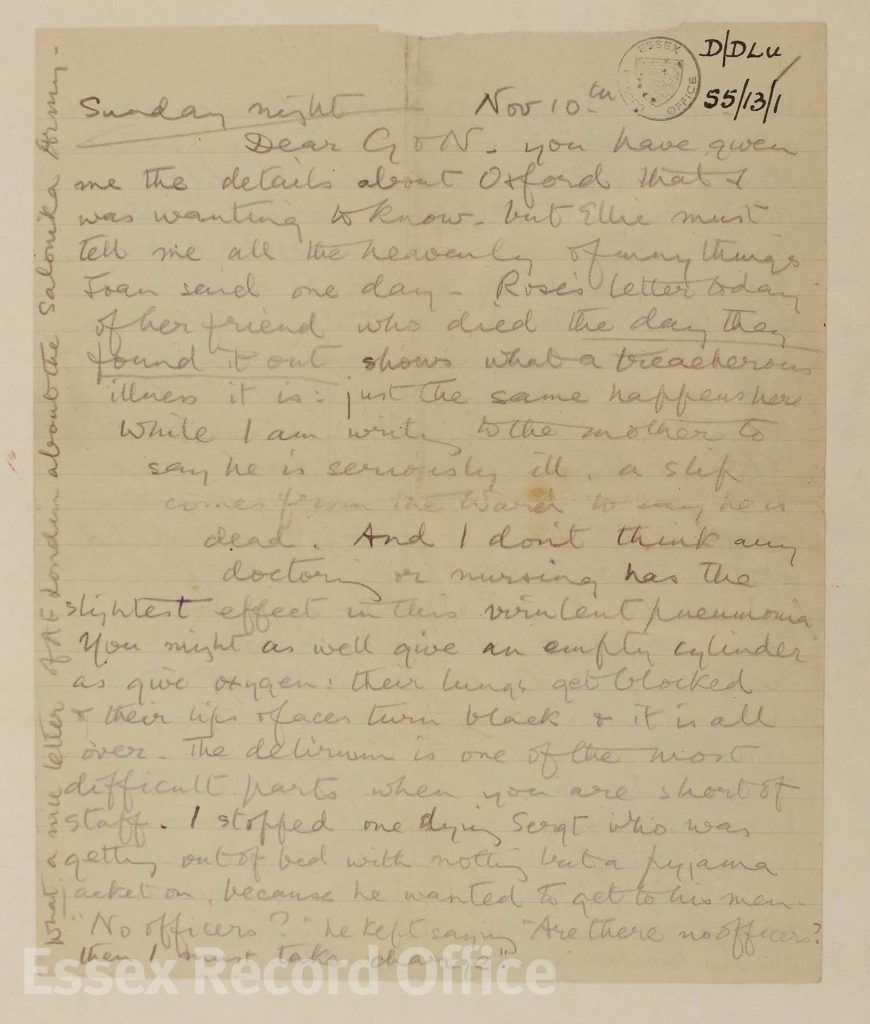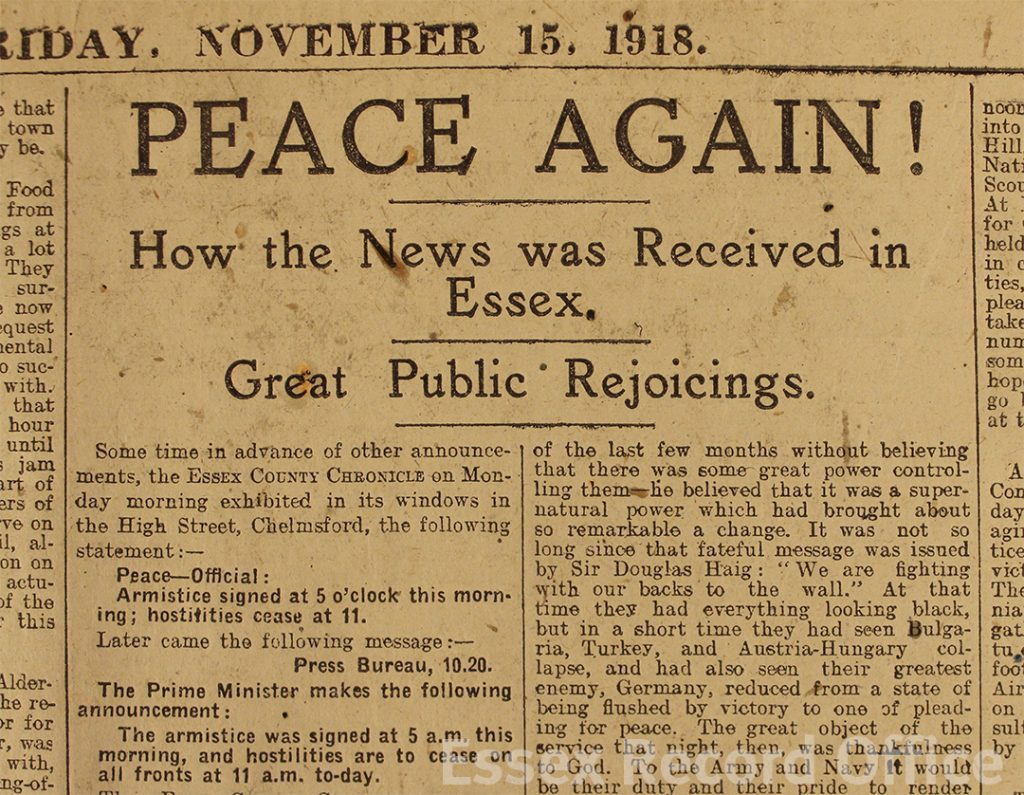100 years ago, on 10th November 1918, Sister Kate Luard wrote a letter home. It was the last night of the First World War, and after everything she had witnessed and experienced in the last four years, she was trying to process that it would all soon be over.
Katherine Evelyn Luard was a remarkable woman. Over the last four years, as part of our contribution to marking the centenary of the First World War we have followed her progress as she nursed countless men on the Western Front. While she cared for the wounded, the sick, and the dying, she frequently wrote home, telling her family what she was experiencing.
Kate’s letters give a sense of a woman of enormous energy and adventurousness with a strong ethos of duty and service. A professional nurse, she trained in the 1890s when nursing was still not an entirely respectable profession for a young woman. She served as a military nurse in the Boer War before returning to civilian nursing. On the outbreak of the First World War she volunteered again as a military nurse, and arrived in France just days after the war had started. Apart from short periods of leave, she remained on the Western Front throughout the conflict, only returning home in December 1918 to care for her aging father.
The letter she wrote on the 10th November 1918 is an extraordinary document, and we thought it worth sharing with you here in full, 100 years after it was written. The letter will be on display in the ERO Searchroom until January 2019.

The first page of Kate Luard’s letter home written on 10th November 1918
Sunday night Nov 10th
Dear G & N, you have given me the details about Oxford that I was wanting to know, but Ellie must tell me all the heavenly & funny things Joan said one day.[1] Rose’s letter today of her friend who died the day they found it out shows what a treacherous illness it is: just the same happens here.[2] While I am writing to the mother to say he is seriously ill, a slip comes from the Ward to say he is dead. And I don’t think any doctoring or nursing has the slightest effect in this virulent pneumonia. You might as well give an empty cylinder as give oxygen: their lungs get blocked & their lips and faces turn black & it is all over. The delirium is one of the most difficult parts when you are short of staff. I stopped one dying Sergt who was getting out of bed with nothing but a pyjama jacket on, because he wanted to get to his men. “No officers?” he kept saying “Are there no officers? then I must take charge.”
[Vertically up the page] What a nice letter from A.F. London about the Salonika Army
Or they get a fixed idea that they are ‘absent without leave’ & must ‘rejoin my battalion’. None of us have ever seen it before in this virulent epidemic form, & the mortality is extraordinarily depressing. In one ward 17 out of 21 died in a few days. Everyone in the influenza wards has to wear a gauze mask & we make a point of off duty time for them. So far only 1 Sister & 2 VADs & three orderlies have gone sick with it, & they are not pneumonic. Several sisters & 1 VAD have died at the Sick Sisters Hosp. No. 8 Gen.
I think it is abating a little. I am so glad Rose is having a rest. Did G go back to Mr A’s?[3] When does Daisy come back from Nash?[4]
There is the most angelic baby Gerry here who had his leg off yesterday. He is so pleased that his mother will see him with a new leg with no pain in it! He has shining golden hair, blue eyes & a child’s smile. Everyone spoils him.
We haven’t nearly so many in now. All our best wards are British again.
About the War, is this really the last night our own RAF will go over dropping destruction into hundreds of Germans? They have already stopped coming over to us I believe. Is tomorrow morning the last time of ‘standing to’, & listening posts, & firesteps, & swimming canals under mg [machine gun] fire & Zero hours & fractured femurs & smashed jaws & mustard gas & the crash of bombs & all the strange doings of the last four years?
It is quite impossible for a war-soaked brain like mine to think in terms of peace; war has come to be natural – peace unnatural.
[Vertically up the page] 1000 thanks for all your letters
This afternoon at the lovely big service at the Cathedral just like St Paul’s with beautiful singing, & the sun lighting up the tracings of the roof, one realised that all the War Intercessions of the last years are about to be answered & as far as actual War goes will be meaningless after tomorrow, though the sick & wounded & bereaved part goes on yet. What a vital set of new Intercessions the Nations will need now, with the warnings of Russia Bulgaria Austria & Germany all disrupting in turn.
There’s nothing Bolshevik about us or the French thank goodness. The French are so domestic & practical & matter of fact just now. In Rouen (apart from the British occupation it amounts to that) you’d never know there’d been a War.
I can’t help wishing Foch[5] had asked Douglas Haig as well as his old pal & Rosie Wemyss[6] to meet the German Plenies. He wouldn’t have won this War without us.
I wish we could ask RW to lunch one day & make him tell us about it, the bowing & saluting & Foch refusing point blank to suspend hostilities during the 72 hours.
What I feel nervous about is who’s going to be responsible for carrying out our terms if they accept them, now they’ve booted out William & Max, & probably Hindenburg & Tirpitz & Ludendorff & Hertling & Hollweg & everyone who has ever run the ship of state? Can the saddler control the nation?
All these awakening citizens must feel such dupes & fools to have bootlicked the Hohenzollern inflation so long. The brave ones who have died for the Fatherland will never know that it wasn’t for the Fatherland at all, as far as victory goes, though perhaps all this mess up will be their salvation in the end, as it has ours.
In a way it seems almost a bigger change from War to Peace than it was from Peace to War – perhaps because there was nothing very glorious about out last 10 years of peace & everything about our 4 years of War has been very glorious.
Goodnight
Love to father
KEL
[1] Joan was Kate’s niece, who had just died of influenza, aged 19. Ellie was Joan’s mother. Ellie had already lost her husband Frank, Kate’s brother, who was killed at Gallipoli.
[2] Rose was one of Kate’s sisters
[3] G is Kate’s sister Georgina
[4] Daisy was another of Kate’s sisters
[5] Marshal Ferdinand Foch, the Supreme Allied Commander during the war, who represented the French at the Armistice Negotiations
[6] Rosslyn Wemyss, a senior naval commander who represented the British at the Armistice negotiations

